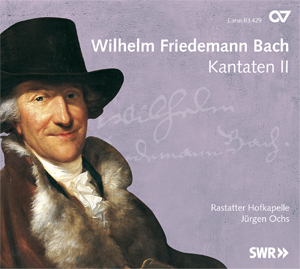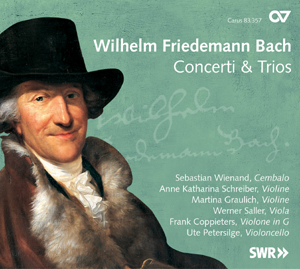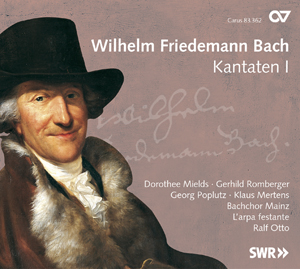
Cantatas II
Contents
-
Composer
Wilhelm Friedemann Bach
| -1784Wilhelm Friedemann Bach, the oldest son of Johann Sebastian, enjoyed the reputation of an outstanding, but at the same time one of the most independent-minded composers of his age. His work represents the ambitious attempt to absorb the legacy of his father and to develop the taste of his own generation further. Lofty artistic ambitions are to be found in almost all of W. F. Bach's works – from the early piano pieces via the cantatas of his middle period to the late sonatas and fantasias. Wilhelm Friedemann Bach wrote keyboard and chamber music, concertos and sacred cantatas. On a high level of technical ability he created a fascinating synthesis of baroque complexities and the emotionally charged galant style. While his instrumental works were written for the most part in Dresden (1733–1746) and Berlin (1774–1784) and are in the style of splendid courtly music, the vocal works date from his time as organist and director of music at the Marktkirche in Halle (1746–1764); they are distinguished by their expressive boldness and virtuosity. Personal details
-
Preface writer
Peter Wollny
| 1961
-
Ensemble
Rastatter Hofkapelle
The Rastatter Hofkapelle was formed along the lines of the original court orchestra and is made up of eight solo singers plus instrumentalists. The aim of the ensemble is to perform the sacred music of the former court music directors in Rastatt and the works of other Baroque composers, observing historical performance practice. More exact information concerning the makeup of the court orchestra is to be found in a court calendar of 1764. According to this source, it consisted of the music director, the concert master, an organist, seven singers and 19 instrumentalists, as well as four trumpeters and a timpanist. All of the members of the Rastatter Hofkapelle are active both as soloists and as members of distinguished professional ensembles concerned with the interpretation of early music. Personal details
-
Conductor
Jürgen Ochs
Jürgen Ochs studied church music at the Staatliche Hochschule für Musik in Karlsruhe, concentrating on the organ and conducting. He studied singing at the Musikhochschule in Dortmund, concluding with the concert examination. His favorite works include the Bach Passions (singing the evangelist roles), cantatas, oratorios of the classical and romantic periods, Lieder, and song cycles. Since 1991 Jürgen Ochs has been the district choirmaster of the Freiburg Archdiocese, first at Breisach Minster, and in the meantime at the Catholic municipal church of St. Alexander in Rastatt. He is the conductor of the chamber choir Capella Crucis, and of the Rastatter Hofkapelle. He is also professor of singing at the Hochschule für Kirchenmusik in Rottenburg/Neckar. Personal details
-
Soloist - soprano
Beate Spaltner
-
Soloist - soprano
Ursula Benzing
-
Soloist - alto
Judith Ritter
-
Soloist - alto
Matthias Lucht
-
Soloist - bass
Johannes Happel
-
Soloist - bass
Claus Temps
Reviews
Der Gesamtklang ist so wunderbar transparent, absolute Reinheit ist selbstverständlich […]
Konrad Klek, Quatember, 2/2011
[…] erstaunlich lichte und silbrig-klare Transparenz, die beschließenden Choräle kann Jürgen Ochs zudem wundervoll samtig und innig gestalten.
Bach Magazin, Heft 17, Frühjahr/Sommer 2011
Ein überzeugendes Plädoyer dafür, sich […] mit dem Vokalwerk Wilhelm Friedemann Bachs auseinanderzusetzen.
Musik & Kirche, März/April 2011
Die interpretatorisch wie aufnahmetechnisch exzellente Einspielung […] [nimmt ein] durch musikantischen Elan, unforcierte Expressivität und klangliche Opulenz.
www.codexflores.ch, 02.05.2011
Zwei neue CDs, beide fast ausnahmslos mit Ersteinspielungen angefüllt, dokumentieren die weithin vergessenen musikalischen Perlen und führen zu einem audiophilen Genuss.
Peter Wollny, musik&liturgie, 1/11
The cantatas and Mass compositions performed here for the first time are outstanding artistic contributions to the genre of the church cantata after J. S. Bach.
BBC Music Magazine, 01/2011
It's music of great quality and Carus is to be congratulated and supported for making it available: all the items on this CD are world première recordings. Even were they not, even were the performances mediocre, this would still be a collection to buy immediately – W.F. Bach's choral music is imaginative, technically accomplished, original and beautiful. […] The acoustic and booklet are supportive of the music; the latter informative with texts. One anticipates eagerly the next volume in this series.
Mark Sealey, musicweb-international.com, 01/2011
Bemerkenswert ist die durchweg unaufdringliche und bewusst schlicht gehaltene Interpretation der Rastatter Hofkapelle, die aus einem sehr klein besetztem Chor und einem mit historischen Instrumenten ausgestatteten Orchester besteht. […] Das wohl andächtigste und am meisten mitreißende Werk dieser Aufnahme ist die nur aus Kyrie und Gloria bestehende Missa in g-Moll. Die ‚kunstreiche Mannigfaltigkeit’ des Komponisten kommt besonders in der Fuge des Schlusschores 'Du bist allein der Höchste' zur vollen Geltung. Trotz der komplexen Polyphonie geht von diesem Schlusssatz eine besonders andächtige, erhabene Wirkung aus, die auch der präzisen Interpretation des Chores zu verdanken ist.
Marion Beyer, klassik.com, 06.01.2011
Der – 1784 verstorbene – Bach-Spross komponierte eine gut hörbare, gefällige Musik, die versiert und zudem polyphon gewandt klingt. Bei der Rastatter Hofkapelle ist sie unter Leitung von Jürgen Ochs in besten Händen.
Johannes Adam, Badische Zeitung, 11. Dezember 2010
Eine exzellente Würdigung erfährt W. Fr. Bach „in seinem Jahr 2010” einerseits durch eine Veröffentlichen der Gesammelten Werke, vorgelegt vom Bach-Archiv Leipzig in elf Bänden (Editionsleitung: Peter Wollny), erschienen im Carus-Verlag. Andererseits ehrt ihn eine ebenfalls bei Carus herausgekommene Edition von fünf CDs mit Kantaten und Instrumentalmusik, realisiert von führenden Musikern der Szene der Alten Musik in Deutschland, die jene von Wollny eingeforderte Empathie in ihre Interpretation einbringen. Man kann nur hoffen, dass auf diesem Niveau allmählich das gesamte (doch recht überschaubare) Werk von Wilhelm Friedemann wiederentdeckt wird
Bernhard Morbach, kultur radio, 19.11.2010
Frequent questions about this work
 There are no questions and answers available so far or you were unable to find an answer to your specific question about this work? Then click here and send your specific questions to our Customer Services!
There are no questions and answers available so far or you were unable to find an answer to your specific question about this work? Then click here and send your specific questions to our Customer Services!




